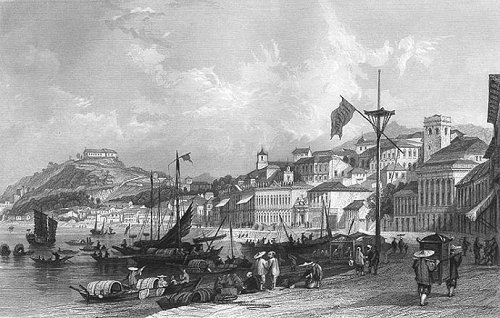




The Portuguese were once celebrated for commercial enterprise-for the propagation of the Christian religion-for a love of arts, and the cultivation of literature; of all these noble qualities, few evidences have been perpetuated, if we except the sumptuous architectural wonders of old Lusitania herself. The little sovereignty in the Eastern seas, which they once possessed, has gradually decayed; their colonies have been erected into independent governments; their very monarch, a scion of the ancient house of Braganza, forsook the throne of his fathers on the approach of the invader, and left to England and to Wellington the glory of reconquering his hereditary dominions.

The fate of the nation has therefore been proportioned to the genius and resolution of its sovereigns; and Macao, where once a flourishing trade existed, where Spain, Portugal's haughty neighbour, was compelled to strike her own flag, and hoist the standard of her rival, whenever she approached the shores of China-whenever English enterprise found a profitable field for operation-this Macao is now simply, solely, a record of the past.
The Pria, or Praya Granda, is the most flattering surviving specimen of this emporium of Oriental trade. Approached from the water, this fine ambulatory presents a striking and agreeable appearance. A row of handsome houses, extending along the beach for upwards of seven hundred yards, is built in a crescent form, in obedience to the graceful and regular bend of the bay. In front, a spacious promenade is formed, on an artificial embankment faced with stone, interrupted, occasionally, by jetties for landing goods, and by steps for descending to the water. Here is the residence of the Portuguese governor, and here also is the English factory, plain substantial buildings; besides the Custom-house, distinguished by the display of the Imperial flag in front. At the termination of what is called the High-street, stands the Senate House, a structure whose pretensions to architectural beauty are of the humblest character, but its dimensions considerable. Beyond the Praya Granda, a mixed assemblage of styles presents itself, including English houses, towers of Portuguese churches, Chinese temples, and domestic roofs, generally grotesque. The church of St. Joseph, the most spacious and beautiful of the twelve which the first settlers raised here, dedicated to the Apostles, is collegiate, and richly adorned. The sea-view of the city does not partake of the Chinese character, because the low natives who reside at Macao inhabit the back streets only, and their dwellings being but one story in height, are' concealed by the Portuguese and English houses that surround them: the Chinese are generally dealers in grain, vegetables, and sea-stores, in addition to their employments of joiners, smiths, tailors, & etc.
Besides the college of St. Joseph, Macao boasts a grammar-school of royal foundation, and some few other institutions of Portuguese origin devoted to literature; amongst the charitable establishments is an asylum for female orphans. At the extremity of the Praya Granda is a spacious and elegant demesne called the Casa, in which is ostentatiously shown a natural grotto, where Camoens, once the Portuguese judge at Macao, is said to have written the greater part of his Lusiad.
The roadstead for large vessels being on the other side of the peninsula, about ten miles distant, the immediate trade with the inner harbour, which is shallow, is conducted by lighter-junks and large boats. Before the war with China in 1843, every foreign vessel, on casting anchor in the roadstead, was boarded by a pilot, who, having ascertained the nature of the cargo, reported accordingly. The ship's boat then proceeded to the Custom-house, where a toll was paid, permission obtained to land any female passengers who happened to be on board-the imperial regulations not allowing them to go as far as Whampoa-and a chop, or permit, procured to pass the Bogue, or Bocca Tigris. Many of these precautionary measures were superseded by the severe chastisement inflicted upon China at that time, and the commerce of Macao has been to a great extent transferred to Hong-Kong. The dulness of Macao is unbroken by any incidents of interest, if we exempt the annual immigration of Cantonese families, during the sultry season in the great city, of which the Portuguese avail themselves by holding a grand carnival This feast is celebrated with the utmost costliness and enthusiasm- balls, masques, concerts, spectacles, and all other amusements, that minister to the pleasure of soft, southern Europe, are called in, to aid in giving effect to the Macao carnival.
Opposite to the spot where the cave of Camoens is situated, lies a small island, where the Jesuits formerly had a church, a college, and an observatory, but the melancholy ruins that now cover the surface of this picturesque and fertile spot, only remind the visitor of the fallen fortunes of that classic community. This pretty object is the ornament of the inner harbour, which is secure from the north-east monsoon, the terror of all vessels that venture to lie in the outer. Exclusive of Portuguese apathy, there is a natural cause now operating for the destruction of the trade of this port-it is the gradual filling up of the harbour with sand. The existence and progress of this unfortunate change are very clearly perceived by the following authenticated statement:- when Lord Anson visited Macao, his ship anchored in the basin on one side of the harbour, formed by a group of four islands, and lay securely there during her repairs' at the present time, a ship of equal size and burden could not enter the same basin at all.